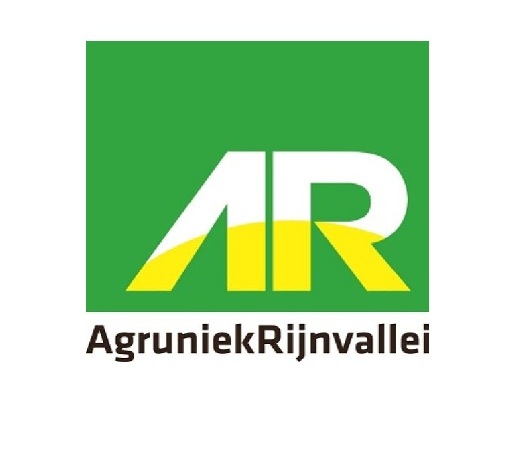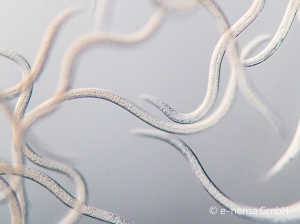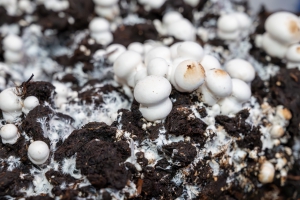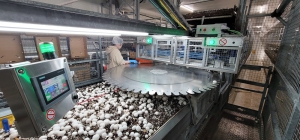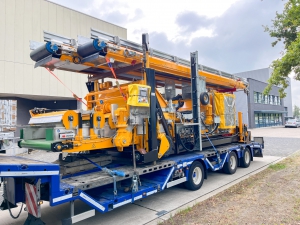
Mushroom Matter
Welcome on our platform. Why MUSHROOM MATTER? Because mushrooms play an important role in our lives as well in business. Our goal is to bring the world the very latest mushroom news with the upmost care to support the positioning of our beloved Mushroom.
E-nema will once again be present at the Mushroom Days in the Netherlands and that's good news for growers striving for strong, uniform, and sustainable crops. As a pioneer in biological crop protection, e-nema has been developing beneficial nematodes for over 25 years, which offer a natural solution to harmful insects in mushroom cultivation.
E-nema has developed a product line specifically for the mushroom industry aimed at effectively combating the sciarid fly (fungus gnat). These nematodes work deep into the substrate, actively seek out their prey, and thus significantly help control the population, without the use of chemicals.
At the Mushroom Days, e-nema will be happy to explain how these living organisms work, how they can best be applied, and the benefits growers experience in practice. Whether you're looking for a more sustainable solution, better pest control, or simply interested in the latest biological innovations, e-nema's experts are ready to answer all your questions.
Visit their booth and discover how natural enemies can be a powerful ally for healthy and future-proof mushroom cultivation.
Possible mechanisms involved in the fruiting of the cultivated mushroom - by David M. Beyer
To induce A. bisporus fruit body formation, a casing layer is applied to the surface of the compost. Without a casing layer, few if any mushrooms will form. Several theories have been proposed over the years to explain why a casing is needed to initiate the fruiting of mushrooms. I will attempt to cover most of the theories, but will not mention the scientists or researchers who proposed them. If the reader is interested in that information, please contact the author.
A variety of materials have been used for casing. Topsoil, clay peat, spent compost substrate, crushed brick, coal ash, rock wool, pelletized recycled paper products, fly ash, coconut hulls, and various combinations of peat-sand, peat-soil, and peat-vermiculite. It is rather difficult to draw a common property from all these materials, which may serve as a trigger for the mechanism to induce mushroom formation. Several theories have been presented to explain the function of the casing layer and the initiation of the fruiting mechanism.
1. Moisture and Pressure relationships: It has been suggested that a macro-climate in the mushroom house and a micro-climate at the bed surface exist, which will create conditions of slow but continuous evaporation without desiccation of the compost. This special water gradient between the compost, casing, and air is claimed to be necessary for the formation of mushrooms. However, this idea is not supported by those who have grown in caves and in certain chambers where relative humidities are 100% and little to no evaporation occurs. Evaporation seems to play a more important role in pin development. The pressure theory suggests that mechanical pressure exerted by the casing on the mycelium initiates the fruiting process. However, this theory does not seem reasonable, where, under conditions of poor ventilation, little or no fruiting occurs, yet the pressure from the casing still exists.
2. Kleb’s or Klebsian theory: This theory suggests that the tendency for fructification in the casing (soil) is caused by the soil being largely devoid of nutrients yet favorable in its external conditions, such as temperature, moisture, and aeration, for the growth of mushrooms. In other words, reproduction in lower organisms, such as fungi, occurs when characteristic external conditions become unfavorable for growth. Exhaustion of the food supply favors reproduction. As the mycelium grows from the nutrient-rich compost into the casing layer, which is nutritionally poor, fructification is stimulated. This theory was tested by drying and grinding compost to a fine dust. The dried compost was rewetted and used as casing on the same compost after a complete spawn run. Normal mushrooms and a good yield were obtained. Similar experiments were performed, and, in all cases, normal yields were achieved. Therefore, it has been shown that this theory of a change in external low-nutrient conditions cannot be applied to the commercial mushroom, A. bisporus.
3. Fruiting Hormone: These theories propose that a substance, possibly volatile in nature, is produced by the mushroom mycelium, which acts as a hormone that stimulates fruiting. In this scenario, the casing layer acts to either increase or decrease the concentration of the “hormone,” ensuring the proper concentration of the substance is reached and maintained to initiate fructification.
One mechanism that was proposed suggested that some volatile substance emitted from the mycelium in the compost and in the casing stimulates mycelial growth and inhibit fruiting. It was suggested that the function of the casing was to provide a medium for rapid oxidation-reduction reactions that would destroy this compound. However, when moist white-silica sand (an inert material) was used as casing material and placed in a high RH chamber to prevent drying, normal mushrooms were formed, and a good yield was achieved.
Other experiments were performed in closed-chamber experiments, which showed that mushrooms do not form unless the air circulated in the system was washed with soda lime, mineral oil, or alkaline KMnO4. A similar closed chamber setup, which recirculated the air while providing provisions for introducing oxygen into the system as needed, was used to demonstrate that when the same air is recirculated into the growing chamber, no mushrooms form. When air was circulated through charcoal, and then back into the chamber, normal production occurred. Air that was washed with soda lime to remove CO2 and possibly some short-chain organic compounds did not form mushrooms. Both researchers showed that a substance produced that is not removed will inhibit the fruiting of the mushrooms.
Another researcher suggested that a high-molecular-weight substance, hormone-like and highly volatile, is produced by the mycelium. The functions of any casing layer are to sufficiently inhibit the volatilization and/or diffusion of the material so that a certain concentration is obtained to provide the stimulus for fruiting in the mycelial network of the compost. This substance and/or other materials, if present in too high a concentration, inhibit fruiting by adversely affecting the rhizomorphs in the casing layer.
4. Carbon Dioxide (CO2): Experiments were conducted introducing various amounts of CO2 into a closed chamber. He found that concentrations above 0.5% caused an inhibition of fruiting. Using more precise monitoring and detection equipment, others found that CO2 concentrations as low as 0.1% had a detrimental effect on fruiting and that different mushroom strains responded differently to different concentrations. From these experiments, a theory was proposed that a partial pressure gradient of CO2 is necessary for fructification of the commercial mushroom. The casing layer is the region where the high CO2 connections meet the low concentration above it. For fructification to occur, they suggested that the level of CO2 above the casing must be less than 0.1% to 0.5%, but the strains used today will fruit at levels above that.
5. Stimulation by microflora theory: Another proposed theory on the initiation of fruiting is initiated by microorganisms. By inoculating fruiting mushroom initials on a petri dish with sterilized compost and casing, it was shown that no fruit body initials formed. However, using non-sterilized casing on the other half of the petri dish, fruiting occurred. It was concluded that a living organism was responsible for initiating fruiting. It was further postulated that these organisms were bacteria, and they lived in the casing. It was suggested that the bacteria were stimulated by volatile metabolites from the compost mycelium, which were oxidized or converted by the bacteria, thus initiating fruiting. Several bacteria have been isolated from the casing layer and proposed to be involved in the fruiting process. Pseudomonas putida has been isolated from the casing, and it was suggested that it was the growing mycelium that released volatiles into the environment of the casing, which allowed for the predominance of this bacterium.
However, several studies have shown that the addition of activated charcoal to the sterilized casing facilitates fruiting. It was suggested that charcoal adsorbs the volatile metabolites of the mushroom mycelium, which controls vegetative growth, thereby eliminating the barrier to fructification. These studies effectively disprove the theory that bacteria alone are essential for the fruiting of A. bisporus. However, bacteria may have an influence on the quantity of fruit bodies initiated during commercial mushroom production. The increase in vegetative mycelial growth and fewer pins in high-temperature pasteurized casing compared to non-pasteurized casing is circumstantial evidence supporting a role for bacteria.
At least six metabolic gases have been shown to be produced by the mycelium of A. bisporus: CO2, ethylene, acetaldehyde, acetone, ethyl alcohol, and ethyl acetate. Although others suggested that acetone was the most important gas, the fungistatic effects of ethylene on many soil-borne fungal pathogens are well known. Substantial levels of ethylene have been shown to be produced from the mycelium, not the fruit bodies, of A. bisporus as the pins were rapidly developing.
The association between lipid metabolism and fruiting in A. bisporus was discovered quite by accident while studying the supplementation of mushroom compost at casing time. While adding materials that would be economically available for growers, researchers discovered exceptional pinning yields when a meal they used contained oil with lipids. Further research has shown that materials containing lipids and oils improve pin initiation and mushroom yield.
Summary
It appears that no single mechanism is responsible for initiating the mushrooms' fruit bodies and determining the quantity of mushrooms that form and develop. Our best guess currently involves the role of microbes and the accumulation of one or more volatiles in the casing layer. Are the microbes producing these volatile compounds, or are they using them in their metabolism, thereby accumulating them in their cells? What is the role of lipids as a nutrient for the mushroom spawn growth, pin formation, and yield? It is known that mannitol plays a role in the osmotic potential gradient between the spawn in the compost and the mushrooms growing on the casing. But is that the only nutrient influencing pinning? Hopefully, someday, research technology will enable us to answer some of these questions and provide growers with more tools to control pin sets, resulting in optimum fresh quality and maximum yields.
Every breakthrough in mushroom cultivation begins with a simple question: how can we do this better? For years, growers around the world have faced the same relentless challenges, labour shortages, ergonomic strain, rising production demands and the constant pressure to maintain quality with fewer hands in the growing rooms.
Every major advancement in mushroom production begins with a familiar question: How can growers produce more, at higher quality, with less dependency on scarce labour?
Around the world, farms are facing rising labour costs, declining availability of experienced pickers, and intensifying pressure to improve yields and consistency.
These realities have accelerated the need for practical, scalable automation.
Modern infrastructure such as the Christiaens drawer system offers a strong foundation, like Henry Ford did for automobile manufacturing more than 100 years ago – assembly lines bring the product to the workers rather than moving the workers to the product.
The critical breakthrough comes from pairing that design with a robotic harvesting platform capable of real, measurable performance in commercial conditions.
That is where Mycionics, a trailblazer in mushroom robotics, has stepped forward to set a new standard.
It started with a shared challenge
Christiaens and Mycionics began from the same place as suppliers: working inside commercial farms, studying picker behavior, understanding crop variability, and listening to producers' daily frustrations, labor.
The original drawer-based harvesting concept was designed to simplify access to the crop, but real value would only emerge if automation and robotics delivered consistent performance, solved labour shortages, and protected product quality.
For Mycionics the question was clear: Could robotics not only match human pickers, but outperform traditional workflows, while improving yield, reducing waste, and making harvesting more predictable?
Real-world pilots and proof
To ensure robotics would succeed in challenging farm environments, Mycionics launched intensive field-testing in 2024 at South Mill Champs’ Apex 2 facility in British Columbia, where operators quickly integrated the technology into daily workflows, even nicknaming the robotic pincers “Jessica.”
During these pilots, the robots:
- Worked side-by-side with humans through humidity swings and rapid growth cycles.
- Harvested around the clock, averaging the same performance as a human harvester.
- Proved to be intuitive to operate, maintain, and clean all within food-safe and harsh environments.
This phase proved a critical point: The market needs both automation and intelligence to move forward, and Mycionics technology is ready to deliver.
Digitizing the crop, transforming the workflow
From the earliest prototypes, Mycionics focused on one principle: automation must be crop aware.
Using advanced vision systems and AI, scanning each drawer bed digitizes with up to 99% detection accuracy. The system maps each mushroom’s size, location, growth rate, and environmental signals. This enables graze harvesting, reduced waste, better watering, predictable quality, and data-driven decision making. When using manual pickers – Crop scout turns them into robots, making all the decisions for them.
Added intelligence layer
Through Crop Scout, each mushroom receives a “digital identity”, capturing its growth rate, density, microclimate, and much more. Growers gain a live crop overview, even remotely, via mobile devices.
What started as a harvesting tool is now a connected farm ecosystem.
Collaborative robotics
Recognizing that many farms aren’t prepared for, and aren’t likely to achieve full autonomy – especially in peak flush, Mycionics supports:
1. Fully autonomous harvesting and packing
2. Co-bot workflows where humans augment robotics for tasks like thinning
In traditional Dutch-shelf farm environments, Mycionics also provides solutions, including automated packing systems that reduce labour by 50% with minimal infrastructure investment.
From prototype to proven performance
Early deployment at commercial farms shows:
- Pick rate: 30 per minute during pilot, up to 80–90 ppm with 4-arm robot
- Mass harvested: ±12,000 lbs. per cycle (up from 3,550 lbs.)
- Labour replacement rate: 75% (up from 33% at first pilot) where staff support thinning
In mixed workflows, the robot can provide over two-thirds of total picking and mass rates, while optimizing where to pick and when making sure the right mushrooms are picked at the right time for maximum weight – eliminating thousands of manual picker decisions.
Designing a system for full-scale automation
The Christiaens drawer platform provides a stable, ergonomic foundation, while Mycionics adds:
- Modular Picking & packing robotics
- Integrated scanner + pointer
- Real-time crop intelligence with autopilot, reporting & harvest optimization
Deployment today in North America and Europe
The Mycionics modular platform is now a fully operational, commercial solution already deployed across North America and Europe, including Canada, the Netherlands demonstrating paybacks of less than 3 years.
A decade of research investment and development is now delivering measurable change in real farm environments.
The result: a new standard
Mycionics delivers:
- Up to 75% true labour reduction
- 6–12% yield improvement
- Full crop digitization with reporting and analytics
- Predictable scheduling and autopilot harvesting
- Improved work conditions
A solution with purpose
The drawer system didn’t start as a machine. It started as a challenge, one familiar to every grower. Through collaboration, field experience, and a shared drive for smarter farming, Christiaens Group and Mycionics turned a concept into a reliable, field-ready harvesting solution.
Because innovation isn’t only about technology. It’s about transforming the way farms work. And sometimes, the biggest leap forward begins with going back to first principles and rethinking the way we grow and pick mushrooms from the start.
https://www.mushroommatter.com/details/itemlist/user/42-mushroommatter?start=0#sigProId793fdfb9bd
Latest newsletter
Stay connected,discover the latest in the mushroom industry
Our newsletters bring the world of mushrooms straight to your inbox, from the latest innovations and technologies to inspiring stories and sustainable solutions. Every month, thousands of readers, growers, suppliers, researchers, and enthusiasts from across the globe, stay informed through Mushroom Matter.
Not yet subscribed?
Stay ahead of the curve and never miss an update on trends, insights, and stories from the mushroom world.
Share your story, innovation or brand
Would you like to position your company, product, or research in front of an international audience?
Our platform offers global visibility through::
-
Monthly newsletters reaching professionals across the mushroom value chain
-
Sponsored articles and advertorials that highlight your expertise
-
News placements about your company’s latest developments or innovations
-
Website banners and packages tailored to your goals
Advertising with Mushroom Matter means being part of a community that values quality, innovation, and connection within the global mushroom industry.
Together we make the mushroom world grow and matter
At Mushroom Matter, we believe in sharing knowledge, inspiring innovation, and connecting people who care about the future of fungi. Whether you want to read, share, or advertise, this is your gateway to a growing global network.
If you remove the mushroom, nature falls apart
We often think of mushrooms as the visible fruit of a hidden world. A delicacy, a medicine, or simply a curiosity popping up after the rain. But beneath every mushroom lies an unseen network that is nothing less than the foundation of life on Earth. Remove the mushroom and nature, as we know it, begins to fall apart.
The hidden network beneath our feet
Every forest, meadow, and even your backyard soil hides a dense web of fungal threads called mycelium. This living network connects plants, trees, and microorganisms in an intricate underground communication system. It transports water, nutrients, and information, a kind of “wood wide web” that sustains entire ecosystems.
Without fungi, plants would struggle to grow. In fact, more than 90% of all plant species depend on a partnership with fungi known as mycorrhiza. These fungi attach to plant roots, exchanging minerals and moisture for sugars and carbon. It’s a perfect example of nature’s collaboration and without it, most forests would collapse.
The great recyclers
Fungi are the world’s ultimate recyclers. They decompose dead trees, fallen leaves, and animal remains, breaking down complex materials into nutrients that can be reused by other organisms. Without this process, forests would be buried under layers of organic waste, and the soil would become sterile.
In essence, fungi close the circle of life. When we remove them through soil degradation, chemical overuse, or deforestation, we break that natural recycling system. Nutrients stop flowing, and biodiversity declines.
An unsung climate ally
Fungi don’t just support plants — they also store massive amounts of carbon underground. Mycorrhizal fungi capture carbon from plant roots and lock it into the soil for decades or even centuries. Destroying fungal networks not only weakens plant life but also releases stored carbon back into the atmosphere, accelerating climate change.
The mushroom’s message
Mushrooms are the tip of a vast, intelligent system that has quietly sustained life for over a billion years. They are nature’s architects, caretakers and messengers, indicators of ecosystem health. When mushrooms disappear, it’s not just a culinary loss; it’s a warning sign that our environment is out of balance.
Protecting fungi means protecting life itself. Healthy soil, resilient forests, clean air, and even the food we eat all depend on the unseen world beneath our feet. So next time you see a mushroom in the wild, take a closer look. It’s not just a fungus, it’s a lifeline.
How do you see the role of fungi in the future of a healthier planet? We’d love to hear your thoughts, so drop us a line below!
The mushroom industry has always been an example of how biology and ingenuity can coexist. What started centuries ago as a craft based on observation, experience, and intuition is now rapidly evolving into a field where data and digital technology drive every decision. The next generation of mushroom farms is taking shape, intelligent, connected, and remarkably sustainable.
Automation becomes accessible
Until recently, automation was something only large farms could afford. Complex climate control systems, robotic picking solutions, and data-driven monitoring platforms were impressive but often out of reach for smaller growers. That landscape is now changing. As technology becomes more affordable and modular, small and mid-sized farms can adopt automation step by step, from simple environmental sensors to cloud-based farm management systems.
These tools help growers maintain stable growing conditions, reduce labor costs, and minimize waste. More importantly, they allow farmers to focus on the art of cultivation, rather than on manual data collection or repetitive control adjustments.
Smarter growing through data
Every mushroom tells a story of temperature, humidity, substrate composition, and microbial balance. By collecting and interpreting this data, growers can now understand their crops better than ever before. Artificial intelligence (AI) is entering the scene, helping to predict yields, identify anomalies early, and even recommend optimal growing cycles.
Imagine a system that learns the behavior of your farm, adjusting CO₂ levels, light exposure, or irrigation based on previous flushes while alerting you to subtle changes that might affect productivity. That’s not science fiction anymore; it’s the emerging reality of smart mushroom cultivation.
The rise of AI-assisted strain development
While climate control and automation enhance the growing environment, artificial intelligence could soon reshape what we grow. AI-assisted strain selection combines genomic data, performance tracking, and environmental inputs to identify which varieties thrive under specific conditions. This opens the door to developing new strains faster, with higher yields, better shelf life, or specific nutritional or medicinal properties.
For mushroom breeders and spawn producers, this digital layer adds precision to what has long been an art form, bridging traditional mycology with computational biology.
Transparency and traceability through blockchain
Consumers today want to know where their food comes from and mushrooms are no exception. Blockchain technology can bring new levels of transparency to the supply chain. From substrate sourcing to post-harvest logistics, each step could be securely logged, offering proof of sustainability, origin, and quality.
For growers, it’s also a way to build trust with buyers and regulatory bodies, simplifying certification and export documentation. In a world where sustainability is not just a value but a requirement, such traceability systems will likely become standard practice.
Sustainability: the core of innovation
At the heart of all this progress is a shared commitment to sustainability. Automation and digitalization are not replacing the grower, they’re empowering them to produce more efficiently, use fewer resources, and reduce waste. From optimizing substrate recipes to recycling heat and water within facilities, smart systems are helping farms close the loop.
The mushroom sector has always been a pioneer in circular agriculture. Now, by integrating technology, it is showing that environmental responsibility and innovation can grow side by side.
A future rooted in tradition and technology
The message is clear: the future of mushroom farming is intelligent, data-driven, and sustainable. Yet the essence of the craft remains unchanged, understanding living organisms and creating the conditions for them to thrive. By combining centuries-old cultivation wisdom with 21st-century technology, the mushroom industry continues to prove that innovation grows best on a fertile foundation.
Published by Mushroom Matter: connecting the global mushroom community through insight, innovation, and inspiration
To expand production capacity, Gerber Champignons AG in Seftigen (Switzerland) needed a new head-filling machine, but the filling hall was exceptionally narrow.
Having already worked with several GTL Europe machines, Gerber once again turned to GTL for a tailor-made solution. The result: a custom-built head-filling machine designed to fit perfectly within the limited space and integrate seamlessly with existing hoppers and the winch system.
Installed and tested in just 48 hours, the machine delivers the same efficiency and reliability as larger systems.
The GTL difference for smaller projects
Gerber Champignons AG demonstrates that GTL’s expertise and service level are not reserved for large turnkey projects. Even for standalone machines and specific needs, clients benefit from the same precision, flexibility, and commitment to performance.
Read the full project story here.
Researchers across Europe are developing new building materials made from mycelium—the root-like network of fungi—that grow on agricultural waste.
These materials, part of the EU-funded Fungateria initiative, aim to create construction elements that are sustainable, adaptable and self-repairing.
Some key points:
-
The team uses the fungus Schizophyllum commune grown on waste feedstocks to produce lightweight composites with properties similar to wood or foam.
-
These “living materials” can respond to their environment: for example, walls that close cracks themselves, or panels that absorb CO₂ and clean the air.
-
The materials are designed so growth can be safely controlled — for instance by using light or engineered bacteria to stop fungal growth when required.
-
The environmental potential is significant: using fungal composites could reduce waste and CO₂ emissions compared to traditional building materials
Read the full article here.




